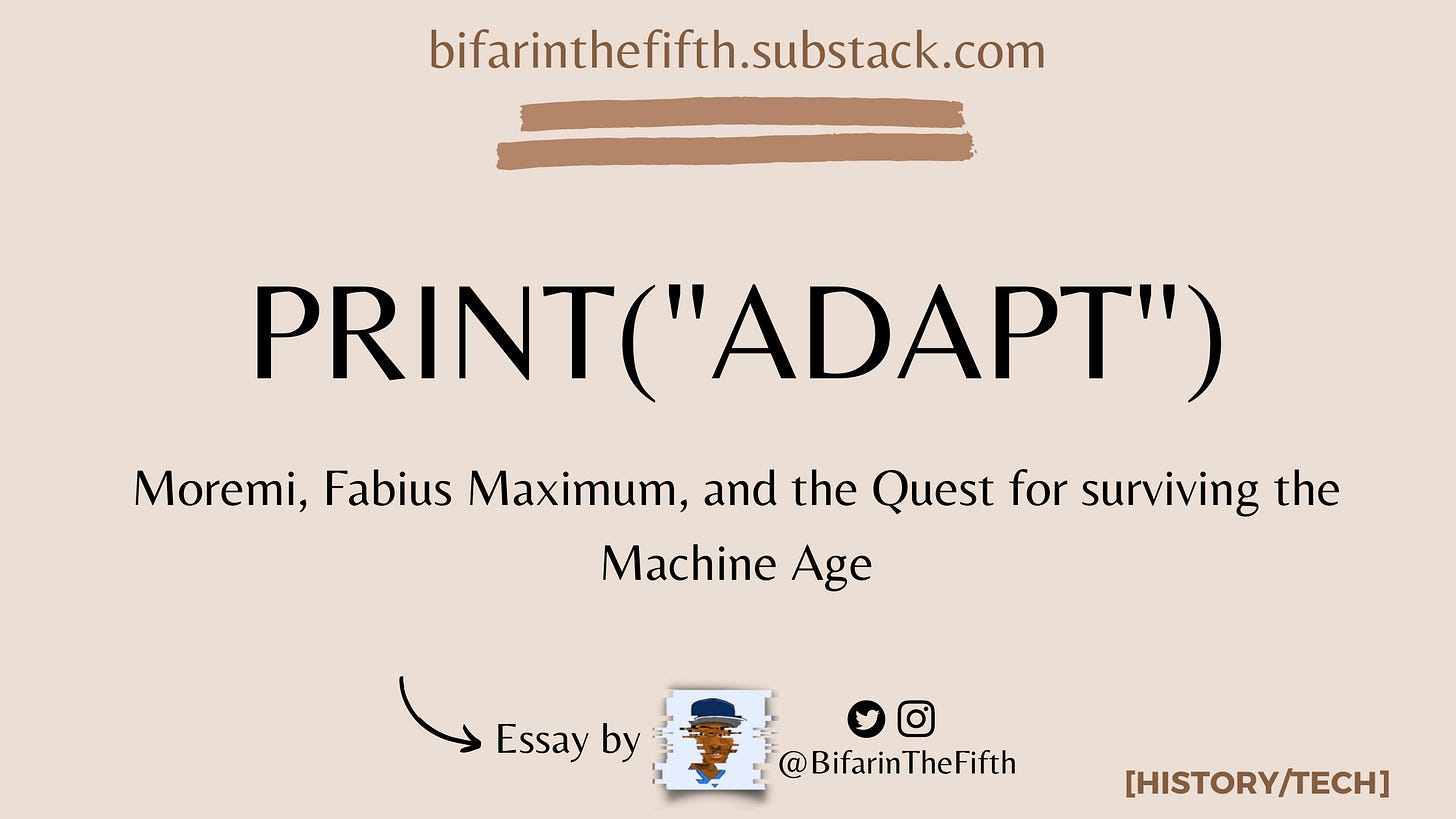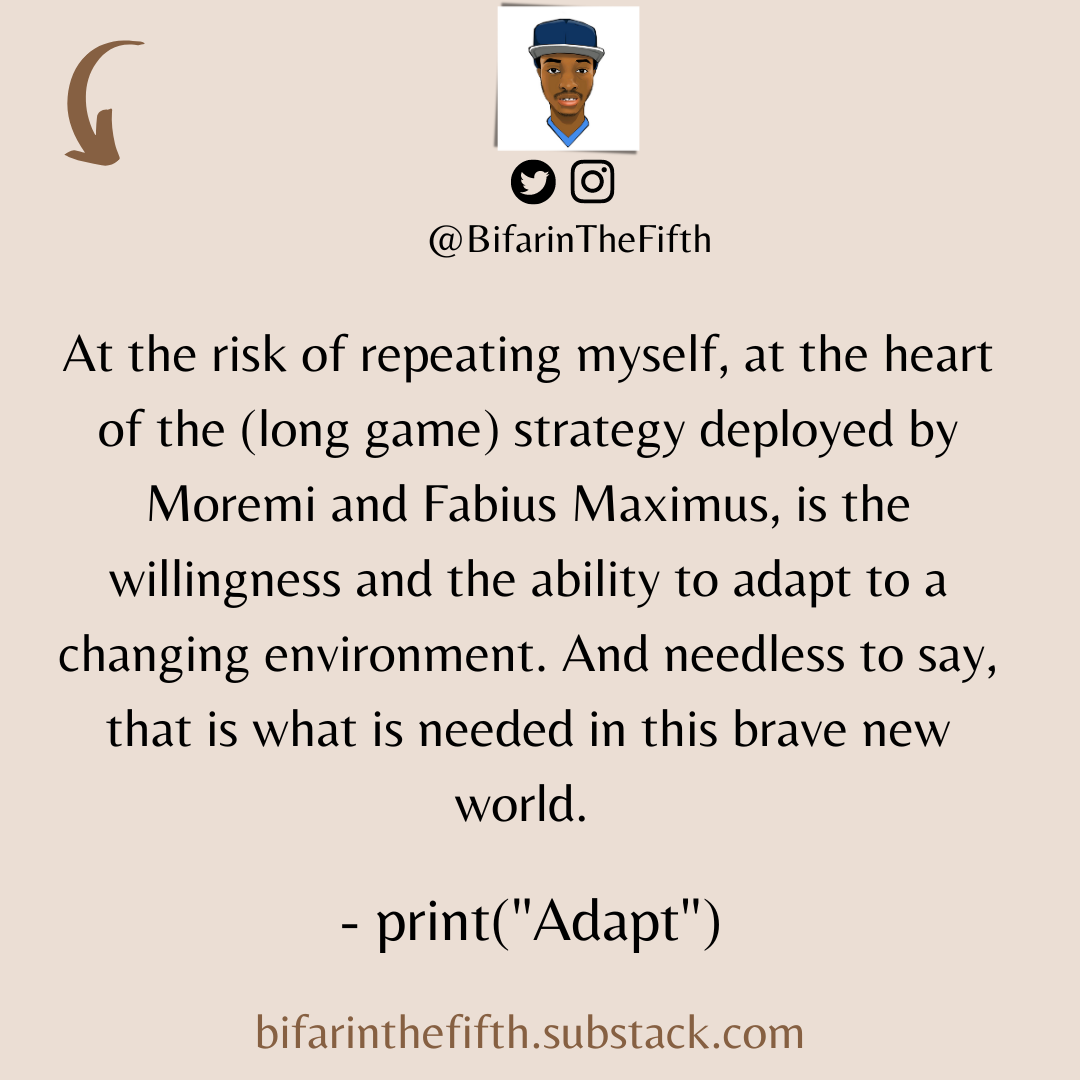Moremi, a detective par excellence – 50,000 soldiers, 9,000 horsemen and some 37 elephants – Fabius Maximus ‘the delayer’ – Dancing with machines.
Moremi, a detective par excellence
Moremi Ajasoro was a heroic ancient queen of Ile-Ife – the cradle of the Yoruba people (mostly living in southwestern Nigeria today. But largely scattered all over the world in Togo, Benin, Cuba, Brazil, etc.)
Oozing with beauty, she had put all the acclaimed warrior-citizens of Ile-Ife to shame – in the face of terror, she was the only person who could muster courage to take a meaningful action.
Legend has it that the Ugbò people [1] terrorizes the Yorubas during the time of Moremi (circa 12th century). Appearing as some sort of demi-gods, they absconded with whatever their hands could carry including women and children, with very limited challenge from the Yorubas. One could only imagine some brave men approaching the invaders, only to be left with broken noses, damaged ankles, bruised faces, and maybe some cracked skulls - unwilling to review their strategies.
Once it becomes apparent to Moremi that they face a difficult opponent; she decided to adapt, play the long game, that of a detective-cum-spy. She allowed herself to be captured, infiltrated the Ugbos, and found her way to the throne. She got married to the invaders’ king, took her time to get accustomed to their traditions, and more importantly to the secrets of the powerful invaders. After due diligence, she escaped from the Ugbos and proceeded to liberate the people of Ife.
Talk about excruciating patience, Moremi’s action isn’t for the faint of heart. Moremi’s actions echo Emperor Augustus famous words:
“That which has been done well has been done quickly enough.”
50,000 soldiers, 9,000 horsemen and some 37 elephants
(If you don’t know about the Punic wars, a hypothetical war between America and China/Russia would be a fair approximation. [2])
That will be our next junction.
From 264–146 BCE, the three staged Punic wars were fought between Carthage (located in present-day Tunisia) and the Roman Republic. Carthage was a standing empire, the big beast in western Mediterranean, that kind of thing (it controlled parts of North Africa and Spain, and some island in the Mediterranean); while Rome – at the time – had its territories spreading like wildfire.
These wars made Rome the dominant power in the west for the next seven centuries.
The first Punic war ended with the Romans gaining the upper hand, as they took control of Sicily – a small island in the Mediterranean (which had been at the center-stage of what started the war in the first place); together with Sardinia and Corsica few years after. But the second Punic war was a different story – the Romans were beaten to smithereens. Thanks to a brutal general called Hannibal!
Instead of confronting Rome directly by crossing the Mediterranean, Hannibal decided to surprise the Romans; Hannibal travelled about a thousand miles to give the Romans a fight. He crossed the Alps with 50,000 soldiers, 9,000 horsemen and some 37 elephants under terrible weather conditions (many died from hunger, severe cold and frost bites) [3].
However, his tactics worked excellent – a surprise package for the Romans.
But the main battleground was in Cannae, where he faced more than 80,000 Roman soldiers with almost half that size. He won bigly. Between 40,000 – 70,000 Romans were killed, with some historian putting the frequency of deaths at a hundred of Romans per minute [4].
The stratagem deployed by Hannibal at the battle of Cannae are still being taught in military academies.
He hanged around Italy for some 15 years after the victory.
Fabius Maximus ‘the delayer’
As you might know the Romans rarely lose wars, (until they finally got busted after the assassination of Commodus in 192CE) all they lose is just a few battles here and there. The entire Punic War ended with the Romans victorious not by a standard ancient warfare battle, but largely through the brilliant insight of a Roman general who took over after The Cannae debacle – Fabius Maximus.
Fabius Maximus played a crucial role in adapting the Roman strategy, recognizing that a direct confrontation with Hannibal's formidable Carthaginian army would likely lead to more devastating losses. Instead, Fabius chose to avoid pitched battles with Hannibal. His tactic involved retreating to fortified towns while burning crops in their wake, which effectively starved Hannibal's army and weakened their ability to fight.
Moreover, Fabius's approach to warfare incorporated guerrilla tactics, in essence playing a long game. By engaging in smaller skirmishes and avoiding decisive confrontations, he was able to gradually wear down Hannibal's forces. This patience and strategic foresight ultimately forced Hannibal to abandon his campaign against Rome, as his army could not maintain their position indefinitely without adequate supplies.

Quintus Ennius, a writer during the period of the Roman Republic wrote “unus homo nobis cunctando restituit rem” – One man, by delaying, restored the state to us. [5]
Dancing with machines
Leaving the world of history and myths for a minute – in the tales of the heroic African Queen, and the Roman General – we find insights so versatile, that one is tempted to say that it transcends time.
In the early twentieth century, say you are a normal person, and you want to have a shot at a good career. You are told to go to school and do very well so you can get a job and get to be the company man - you stick to a company and display your commitment and loyalty. What else is there to do?
Fast-forward to the twenty first century, how do you play this game? In my essay, thoughts on AI, I wrote about AI technologies that are currently disrupting our world (both positively and negatively).
Concerning that, and I stated:
“It should be noted that no technology in modern history has led to mass job loss among educated workers. What we have before us today is a technology with such potential.”
Elsewhere, concerning the popular analogy of AI with electricity, I noted:
“…I quickly realized that the analogy fails in at least a critical way. For example, the rate of adoption of electricity and the various innovations that electricity drives pales compared to what we are seeing with AI. It is not the progress in AI that scares me sometimes. It is the utter speed at which these things happen, and the scale at which it gets deployed. All you need is to just get plugged into the internet. Case in point: OpenAI acquired 1 million customers only after five days of pushing out chatGPT. In two months that number became 100 million active customers, with chatGPT becoming the fastest consumer app in history.)”
I went further and added:
“Today, artists who have trained their entire lives to be good at what they do wake up ‘one morning’ only to be screwed over by text-to-image AI systems like Dalle and mid-journey.”
Close quote.
(That being said there is an incredible amount of productivity that will be unleashed with this tools, which is a great thing!)
It’s being estimated that 80% of Americans could have at least 10% of their work tasks automated with AI; and for ~19% of American workers that number goes to at least 50%. Data processing, publishing industries, information services, to name a few, are ripe for serious disruption.
Early on in January, BuzzFeed was said to cut off 12% of it’s staff and replace employees with AI. Goldman Sachs says generative AI could hit 300 million jobs.
Again, how do you play this game?
At the risk of repeating myself, at the heart of the (long game) strategy deployed by Moremi and Fabius Maximus, is the willingness and the ability to adapt to a changing environment. And needless to say, that is what is needed in this brave new world, at least, in the short/medium term (depending on which scenarios plays out and when: playing a long game might be entirely futile without guiderails, as scientists like Max Tegmark has argued.)
There is also an argument that can be made for focusing on developing skills that are difficult for machines to replicate, such as creativity, critical thinking, and emotional intelligence. But there is a problem here too, that space is closing up pretty quickly. [6]
If you are motivated and able, perhaps a no-brainer strategy is to join the capitalists, build your own world with these AI tools. But in my estimation that solution is sub-optimal, given the framework of capitalism (a kind of inequality is inherent to this system) nor is it practicable – the entire world can’t learn to code overnight, or have enough money to hire those who can code. [7] What am I even saying? The last time I checked ~40% of the world’s population are NOT even on the internet.
However, no matter how you look at it, it is those that adapts that wins [8], while Moremi and Fabius adapted largely by delaying, in this case, time is of utmost essence. And when you are at it, it is important to note that there are also many things to be cautious of, to put it mildly.
Notes
[1] Also called the forest people. “Though the said tribe is believed by scholars to have had no relation to the contemporary Ugbòs of modern Nigeria” Source.
[2] While there are similarities between the Punic Wars and a hypothetical war involving the US, China, and Russia, such as competing superpowers and the potential for widespread destruction, it is crucial to recognize the differences in historical context, modern technology, global interconnectedness, and the potential for nuclear warfare, which make direct comparisons challenging.
[3] The numbers stated varies depends on which historian you ask. Some historians believe the number of soldiers to be closer to 20,000-40,000, and the number of elephants to be around 37, while others suggest fewer than 20 elephants.
[4] SPQR, A history of Ancient Rome, Mary Beard. Pp 180.
[5] Ibid Pp 182.
[6] To support my claim, and for a motivated reader, here is paper from Microsoft you should read (I am currently half-way): Sparks of Artificial General Intelligence: Early experiments with GPT-4.
[7] How does capitalism survives the AI revolution? Since as we continue to go deeper into the revolution, more power will shift from capital to labor. This discussion is beyond the scope of this essay, but Sam Altman has a nice essay on this topic.
[8] This goes without saying but the writer does not support, nor advocate for any adaptation that is unethical.







